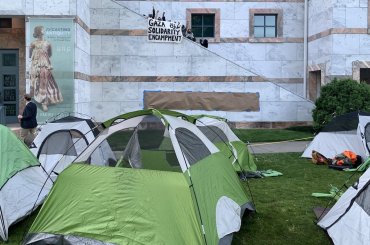This week at the ’Free the Word! Festival‘ in London, the new president of English PEN, South African writer Gillian Slovo, will debate with PEN International President John Ralston Saul the “increasingly blurry boundary in writers’ lives between politics and aesthetics,” and whether writers should boycott festivals in countries with poor records on free speech and human rights. Vice President of International PEN, Canadian novelist Margaret Atwood, rejected the Palestinian call to boycott Israel in May last year, accepting the Dan David Prize for literature at Tel Aviv University in the presence of the Israeli President Shimon Peres. Atwood implied that her opposition to cultural boycotts, as “a form of censorship,” was shared by PEN, telling an interviewer before the ceremony that turning down the prize would be tantamount to “throwing overboard the thousands of writers around the world who are in prison, censored, exiled and murdered for what they have published.” In 2007, PEN American Center had released a statement of principle opposing academic and cultural boycotts as threatening the internationally guaranteed right to freedom of expression.
English PEN fields one of International PEN’s largest Writers in Prison committees, working on behalf of persecuted writers around the world. Its president, Gillian Slovo is also a founder member of the Independent Jewish Voices steering group. Today, an article by Slovo was published in the Guardian newspaper that appears to endorse the Palestinian call to boycott Israel, criticising Ian McEwan for “accepting a prize from Jerusalem’s mayor, Nir Barkat, who has presided over the evictions, demolitions and compulsory purchases that McEwan condemned” in his acceptance speech, thereby risking normalising these policies. While her piece is open to interpretation – she does not explicitly back the Israel boycott – it is perhaps the clearest endorsement we can hope for at this stage from a writer in her position. The clue is in the final paragraph; she cautions that cultural boycotts do not happen in a vacuum, using South Africa as an example: “It was called for by the African National Congress, which represented the majority of South Africans, and it ran alongside a United Nations condemnation of apartheid, a worldwide protest movement and economic sanctions. That, it seems to me, is the way to go.” The Palestinian call fulfills all these criteria, as Slovo knows: in her account on the Jewish Voices website, Lessons from South Africa, the author invokes the tradition of Judaism in which she was brought up: “It says that you must not close your eyes to the pain of others just because they do not have the same colour of skin, or the same religion, or the same ethnic background as you. It says that to point out the injustice of Palestinians being walled into enclaves, or the way the circumstances of your birth can dictate which roads (literally) can be travelled and which passes carried, is reminiscent of apartheid – that to say any of this is not knee jerk anti-Semitism (or self hating). Rather it is the responsibility we all have to make an effort to ensure equality and justice for everybody.”

